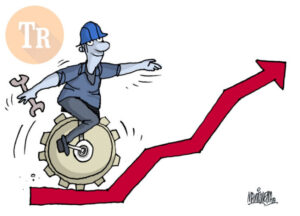“The relationship between Cuba and Belarus is long-standing. Beyond the establishment of bilateral ties in April 1992, they are deep, historical bonds, concerning the friendship and feelings of respect and affection forged between our peoples over many decades.”
So stated Alejandro Simancas Marín, Deputy Director General of the General Directorate of Bilateral Affairs at MINREX (Cuban Ministry of Foreign Affairs), who spoke to the Presidential press group about the significance of the visit by the First Secretary of the Central Committee of the Communist Party of Cuba and President of the Republic, Miguel Díaz-Canel Bermúdez, to Minsk.
The Head of State will fulfil an intensive work agenda, during which he will conduct an official visit to the Republic of Belarus and participate in the Supreme Council of the Eurasian Economic Union (EAEU), an integration bloc shared by Russia, Kyrgyzstan, Kazakhstan, Armenia, and Belarus, which holds the pro-tempore presidency of the mechanism.
This is the second official visit by the Cuban President to the Republic of Belarus. The first was in October 2019. How much progress has been made politically, diplomatically, and economically, and how would you describe the current state of mutual relations?
Cuba and Belarus have a growing and excellent relationship. Both governments share the will to strengthen, expand, and diversify it as much as possible. They maintain high-level political dialogue, with shared values and common positions internationally, and seek to consolidate ties in key areas such as commercial, economic, and financial exchange.
During President Díaz-Canel’s visit to Belarus in October 2019, several documents and a Joint Declaration were signed, reflecting the will to deepen these relations.
Since then, we have maintained high-level dialogue, such as the visit to Havana in July 2023 by then Foreign Minister Serguei Aléinik, and, in that same year, the stay of Prime Minister Manuel Marrero Cruz in Minsk – a fundamental visit reaffirming friendship ties and the will to continue strengthening our links.
During this period, the foundations of the Joint Declaration signed during our President’s 2019 visit to Minsk were consolidated. In 2024, the bilateral economic agenda was signed, which we are working on and which outlines the essential points of cooperation and economic-commercial relations until 2030. A roadmap identifying its substantial elements is also being developed.
We have the mechanism of the Intergovernmental Commissions, which has functioned very positively and proven highly beneficial for continuing to drive mutually beneficial exchanges. Its most recent session, the XII, was held in May during the visit of Vice-Minister Evgueni Shestakov. It is a commission made up of four working groups defining fundamental areas, and we have the will to continue reinforcing it.
High-level political dialogue has also been consolidated, including the Inter-Foreign Ministry Political Consultations mechanism, whose last session was held in Havana in May, where we outlined areas of cooperation. These exchanges yield benefits on bilateral issues, and regional and international affairs.
We must highlight here the consistent position of solidarity Belarus has held in rejecting the US economic, commercial, and financial blockade against our country. It has always maintained a firm position rejecting this policy, as well as in demanding Cuba’s exclusion from the infamous list of alleged State Sponsors of Terrorism compiled by the US Department of State.
“And Cuba, adhering to international law, has been consistent in rejecting the unilateral sanctions measures that the Belarusian nation has faced for many years. Therefore, all the progress we achieve in economic and commercial relations will contribute to confronting those policies and to continuing to develop our economies in the adverse context both countries have had to face.”
What would be the current areas of interest, economically and commercially, between Cuba and Belarus? Have other sectors been identified to boost bilateral cooperation?
We have the challenge of continuing to deepen trade exchange and economic relations. There has been very favourable progress. Last year saw an increase, but we view this as reflecting the scope that exists to continue advancing.
There are three areas that are fundamental, very important for our development. One is biopharmaceuticals – Cuban biotechnology – which has found a very receptive space in the Belarusian market, where there is still ground to cover and which holds many prospects.
Another is the agri-food industry, in which Belarus has significant development. For us, it is important to advance cooperation that allows us to enhance what we need to energise in agriculture. There has already been beneficial exchange in the dairy industry and other branches.
We also have a traditional area, a symbol of our relations: Belarusian tractors, which have been in our fields for over half a century. Currently, we have a project for assembling these at the 26 de Julio Plant in Holguín, with significant development prospects.
Nevertheless, there is a much broader space to work in other sectors, both in agriculture and science – where advanced cooperation exists but much more can be done – as well as environment, education, tourism, and the biotechnology and pharmaceutical industry, which has a multiplier effect on bilateral economic relations.
“President Díaz-Canel’s visit, therefore, will boost that exchange and reinforce relations and bilateral mechanisms.”
In the current global context, what significance does this official visit by the Cuban leader to Belarus hold?
Belarus is a friend of Cuba. The will shared by both countries and peoples has been built over decades and, in recent years, by Presidents Alexander Lukashenko and Miguel Díaz-Canel. Hence the exchange we have had and that is planned will be based on seeking collaboration, on leveraging all spaces offered by our economic and commercial developments, on seizing the opportunities Cuba offers for investments and as a gateway for Belarus to insert its products into the Latin American and Caribbean region.
This will also depend, of course, on the dynamism we impart to our relations at the enterprise level and the facilities we continue building bilaterally with the mechanisms we already have established.
I reiterate, there is a full will on both sides to strengthen this relationship, and Cuba’s interest is to maximise economic and commercial links for mutual benefit.
Another reason for President Díaz-Canel’s visit to Minsk is to participate in person in the Supreme Eurasian Economic Council, as he did in Moscow in May last year, in line with the Island’s interest in maintaining active participation as an observer country in this bloc shared by Armenia, Belarus, Kyrgyzstan, Kazakhstan, and Russia…
The Eurasian Economic Union (EAEU) constitutes an economic integration space that, in just over ten years, has become a benchmark for development and stability. Cuba has been an observer country since 11 December 2020.
“Our presence is not merely a formal fact. We aspire to effective participation, from our observer status, to strengthen political dialogue, exchange, and especially to energise economic and commercial ties with this integration space and its five member countries, with whom we maintain a historical relationship of friendship and collaboration.”
Cuba and the EAEU have several mechanisms to strengthen cooperation and are enhancing them. They have a normative framework including a Joint Plan for the period 2021-2025 – which we propose to extend until 2030 in the coming months – and a Joint Commission which should meet soon and be an important step not only to identify but to work on the realisation of mutual actions in economic and commercial matters.
Our President will participate in the Supreme Council of the Eurasian Economic Union in the expanded segment, alongside the other observer and invited countries. It will be an opportunity to exchange with the leaders of these countries.
Cuba has reiterated its commitment to enhancing its insertion into this mechanism and the will to deepen economic-commercial relations. How much progress has been made in this purpose?
Our participation in the EAEU has had two defining moments. One was the in-person participation of President Miguel Díaz-Canel Bermúdez in the Supreme Council in Moscow in May last year, and, prior to that, the attendance of Prime Minister Manuel Marrero Cruz at the Intergovernmental Council held in Sochi, Russia, in 2023.
As I said, Cuba has always sought to ensure its presence in the EAEU is not a formal act, and despite the geographical distance, it has strived for active participation within it as an observer country.
Ahead of the EAEU Supreme Council, the IV Eurasian Economic Forum will take place in Minsk, featuring a representation of Cuban entrepreneurs. How will our participation in this exchange be, this time directed at debating the Eurasian Economic Integration Strategy?
The IV Economic Forum is aimed at strengthening relations between enterprises within that integration space, and entities from observer and invited countries will also participate. Cuba will have a delegation organised by our Chamber of Commerce.
It will be a small group of enterprises from the biopharmaceutical sector, services, logistics, and metalworking. Despite being a small delegation, the purpose is to work diligently, outline concrete actions with EAEU enterprises present, and hold a session dedicated to the opportunities Cuba offers for investments and business, aimed essentially at the Eurasian economic space, and also the opportunities it provides as a gateway to the Latin American and Caribbean region.
The intention is to insert ourselves effectively into this process, to materialise actions that contribute to strengthening that space and, of course, our economy and our development priorities, such as agriculture, the food industry, energy, transport, tourism, the metalworking industry, and, obviously, biopharmaceuticals.
“Our President’s participation in the Eurasian Supreme Council has an essential component for reinforcing that objective, in the same way that his official visit to Belarus will be largely directed towards enhancing and energising all the opportunities we have been promoting at the bilateral level.”
(Taken from Presidencia de Cuba)




